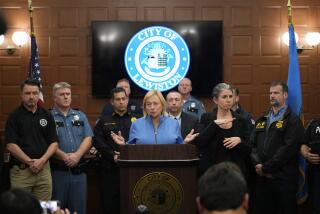Judge leaves Duroville open
After months of deliberation, a federal judge ruled Monday that the Duroville mobile home park could stay open if it made 20 critical changes, including hiring contractors to upgrade its decrepit water, sewage and electrical systems.
“The government has made the request to shut the park down, but this court declines to shut down the park,” said U.S. District Judge Stephen Larson.
Larson said his conditions were reasonable and that he could choose to close the park if they weren’t met.
“I will consider that extraordinarily tragic if it happens,” he said. “I believe we can be successful.”
The judge imposed a 90-day time limit for all conditions to be met, with progress hearings every 30 days.
He said he would rely on the federal government, park owner Harvey Duro, social services and the roughly 4,000 farmworker tenants to make the plan work.
About half the park’s residents are Purepechas, Indians from Michoacan in Mexico, most of whom speak neither Spanish nor English.
The judge’s conditions include ensuring that the 40-acre park has adequate fire protection and proper insurance; that leases are legal and proper eviction procedures are followed; that an outside property management firm is hired; and that an education program is started to ensure residents understand their rights and responsibilities as tenants. Larson also demanded a major overhaul to the crumbling infrastructure.
He said he had thought a lot about the park since putting it into federal receivership in February.
“There hasn’t been a night in the last 60 days that I haven’t worried that something would go wrong out there,” he said.
The U.S. attorney’s office had asked him to close the park, saying it was too dangerous for tenants. Inspections had revealed sewage, electrical and fire hazards throughout the property, which is on the Torres Martinez Reservation.
Larson praised Duro for providing affordable housing to farmworkers and said he would not impose another receivership on him. He also said the United States had had a complicated relationship with migrant workers.
“True courage requires us to take a hard look at our institutions to make sure we can do what we can to make sure justice is done,” he said.
Everyone seemed pleased with the ruling. A representative of the Community Development Financial Institution, a consortium of banks that make community development loans, said she had met with Duro and was prepared to lend him up to $6 million to make the required changes.
“I’m pretty good with the recommendations,” Duro said after the hearing. “It’s what we always wanted.”
Thom Mrozek, spokesman for the U.S. attorney’s office, said the judge essentially granted the office’s request in forcing changes at Duroville. “It was never our intention to have people evicted and cast out on the street,” he said. “Hopefully, this is the beginning of the end of the story.”
Mark Adams, who was the park’s receiver for the last two months, is now the property manager at Duroville. He said repairs would be made over a three- to five-year period. At least 80 trailers will need to be demolished. Residents of those homes will be provided temporary housing elsewhere.
“The pieces are all in place for a very happy ending at Duroville,” Adams said. “Theoretically it could all go wrong, but it’s not going to happen. We have found a public- and private-sector solution to what had been an intractable problem.”
Sister Gabriella Williams, a nun who works in the park, is setting up a child-care center there.
“I think the judge made a very humane decision that was respectful to all parties, and I also think the tenants will be pleased,” she said.
In sweltering Duroville on Monday, residents expressed relief at the reprieve.
“It’s much better to stay, because the people here have no place else to go,” said Margarita Pacheco, 33, who shares a three-bedroom trailer with seven people. “I was very worried before.”
Maribel Reyes, 50, stood on the steps of her trailer with a gaggle of children she was watching. Like most residents, she had not heard the news.
“That’s good, that’s good,” she said. “I thought it was going to close and there was nowhere else for us to live. At first I didn’t even like this place, but now it reminds me of Mexico.”
Down a dirt road, three young boys lay under a rare shade tree, waiting for a neighbor to fill “the pool” -- a big, jagged plastic tub of water about 4 feet deep, which they pay $1 apiece to swim in. An old coffee table serves as a diving board.
“My dad told my mom that we were going to have to go live in my aunt’s house in Coachella,” said Danny Canchola, 9.
Luis Diego, 9, said his family was ready to move back to Fresno if the park closed.
“I’m just happy I’m not going to lose my friends,” said 9-year-old Hector Alvarez. “I don’t want to be homesick.”
--
More to Read
Start your day right
Sign up for Essential California for news, features and recommendations from the L.A. Times and beyond in your inbox six days a week.
You may occasionally receive promotional content from the Los Angeles Times.






